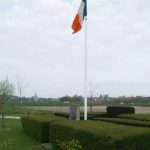Integrity of remembrance
The poem seems hard to find, its text eludes the Google search engine. “Salutation,” written by “AE”, the writer George Russell, in December 1917 was a lament for those who had died in the conflicts of the preceding years. One reviewer describes it as “not very good,” a criticism that derives from literary analysis, but also a perception that the task attempted by Russell is not possible, that one cannot integrate the remembrance of the conflicting traditions.
But isn’t it a counsel of despair to suggest that all Irish people who died with integrity could not be jointly remembered? Anyone who has attended ceremonies in Flanders or on the Somme will have experienced a sense of a new Europe where the killing fields of a century ago are no longer possible? Is such a remembrance not possible in Ireland? Can we not recall the martyrs of Easter 1916 while at the same time placing equal value upon the lives of the Irishmen who died fighting the rebels that Easter week? Can we not acknowledge that the Irishmen who died in the mud of the Western Front and upon the shores of Gallipoli as much believed in the freedom of their country as those in the GPO?
In September 1914, John Redmond, leader of Irish nationalism believed it the duty of Ireland “to the best of her ability to go where ever the firing line extends, in defence of right, of freedom and of religion in this war. It would be a disgrace forever to our country otherwise.” Recruiting posters presented the European war as one in which Irishmen might fight on behalf of Ireland. Whatever the facts of history, people still talk of the Irishmen who went away to fight for “Britain”; one woman last month told me that the men had taken “the queen’s shilling,” to have pointed out that the monarch of the time was George V would have been futile.
AE understood the tensions.
Salutation: To the Memory of Some I Knew Who are Dead and Who Loved Ireland
Their dream had left me numb and cold,
But yet my spirit rose in pride,
Refashioning in burnished gold
The images of those who died,
Or were shut in the penal cell.
Here’s to you, Pearse, your dream not mine,
But yet the thought, for this you fell,
Has turned life’s water into wine.You who have died on Eastern hills
Or fields of France as undismayed,
Who lit with interlinked wills
The long heroic barricade,
You, too, in all the dreams you had,
Thought of some thing for Ireland done.
Was it not so, Oh, shining lad,
What lured you, Alan Anderson?I listened to high talk from you,
Thomas McDonagh, and it seemed
The words were idle, but they grew
To nobleness by death redeemed.
Life cannot utter words more great
Than life may meet by sacrifice,
High words were equalled by high fate,
You paid the price. You paid the price.You who have fought on fields afar,
That other Ireland did you wrong
Who said you shadowed Ireland’s star,
Nor gave you laurel wreath nor song.
You proved by death as true as they,
In mightier conflicts played your part,
Equal your sacrifice may weigh,
Dear Kettle, of the generous heart.The hope lives on age after age,
Earth with its beauty might be won
For labour as a heritage,
For this has Ireland lost a son.
This hope unto a flame to fan
Men have put life by with a smile,
Here’s to you Connolly, my man,
Who cast the last torch on the pile.You too, had Ireland in your care,
Who watched o’er pits of blood and mire,
From iron roots leap up in air
Wild forests, magical, of fire;
Yet while the Nuts of Death were shed
Your memory would ever stray
To your own isle. Oh, gallant dead—
This wreath, Will Redmond, on your clay.Here’s to you, men I never met,
Yet hope to meet behind the veil,
Thronged on some starry parapet,
That looks down upon Innisfail,
And sees the confluence of dreams
That clashed together in our night,
One river, born from many streams,
Roll in one blaze of blinding light.
AE – George Russell, December 1917



We view that period of Ireland’s back story through lenses filtered with the propaganda of innumeral factions, groups and agendas.
Of late I’ve been reading the files released by the army and only one member of the IRA made mention of why people from cottages entered the army. It is impossible nowadays to explain the position the Workhouse stood in sections of Irish society. If you had an estate worker in his 30s with a young family in a cottage and he died from an accident. The family entered the Workhouse and were lost for all practical purposes. The same could be said for a craftsman. And by lost I mean in the way kids were treated in Letterfrack and the laundries.
Yes, there was vast changes in Ireland pre-WW1 and there was a cohort of internationally wealthy people about. True, the civil service were paid very well. But the lower sections were as insecure as they ever were, and perhaps more so.
Further, a loose examination of the economy then -pre WW!- and now shows very frightening similarities.
I chanced upon this almost forty years ago,in the bowels of the libraries of Trinity. In December1917, AE wrote a letter to the Irish Times, calling for inclusivity when the Grea War would end. He finished the letter with his revised version of the poem, ‘Salutation.’ Sadly, the inclusive spirit which he invoked was absent in the subsequent years. I have always had great difficulty in finding this updated version of the poem on any search engines